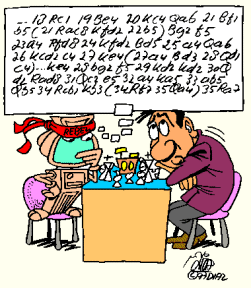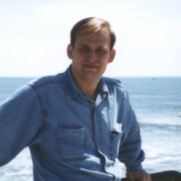Links


 The CHESS 2010 POLL clearly shows that people consider Man versus
Machine games to be more important than Computer versus Computer.
The CHESS 2010 POLL clearly shows that people consider Man versus
Machine games to be more important than Computer versus Computer.
Due to the absence of strong Man versus Machine competitions Rebel company wants to introduce a new initiative called The Monthly GM Challenge.
The goal is that REBEL plays one LIVE tournament game against a grandmaster once a month. Live coverage including Rebel analysis via the Rebel Home Page.
Prizes:
- $500 if the grandmaster wins against REBEL.
- $250 for a draw.
- No prize money in case of a loss against REBEL.
The 7th game is scheduled on Saturday December 4, 1999 against GM Alexander Baburin.
Biographical information GM Alexander Baburin
Full name: Aleksandr Evgenyevich Baburin.
Born: Nizhniy Novgorod (Gorky), 19th February 1967.
Grand Master title: 1996.
International Master title: 1990.
Olympiad team: 1996.
Occupation: professional chess player, writer and coach.
After finishing school in 1984, I went to Gorky University (Radio Physics Department). Studying there was tough and I had little time for chess, which I did not like too much. After one year in the university I was called to the army. Fortunately for me, in the army I spent a lot of time playing chess. After the end of my service in 1987, I joined Army Sports Club. My duty was minimal - to represent my club in All-Army chess competitions. That gave me a small, but steady salary and allowed me to concentrate on chess. Many Soviet masters and GMs made living that way in 70s and 80s. In early 90s that system collapsed. At the university I switched to evening classes. Later I realised that I did not want to become an engineer at all (in 90s in USSR engineers were poorly paid) and quit university after three and half years. I felt that it would be very important to speak English and so I later went to Gorky Institute of Foreign Languages. There I studied English and linguistics for two years. My departure to Ireland in 1993 stopped that study.I became a Soviet master of chess in 1987 and had some good results in tournaments in USSR. When it became easier for Soviet citizens to travel abroad, I began to play in Hungary, Poland and other countries of the former communist block. In 1990 I became an International Master. In December 1991 in Budapest I played in my first GM-tournament and got a norm straight away, tying for first with Christopher Lutz, who got his final GM-norm there. Two months later, again in Budapest, I missed a norm by half of point, failing to win a promising position against GM Tolnai in the last round. That would have been my second and final norm, but I missed that big chance. Then I did quite well in various tournaments and became one of the highest rated (2550 in 1993) international masters in the world. I was also becoming one of the most frustrated IMs, as GM-norms just kept escaping me. I believe it was mainly due to some psychological problems. In 1993 I got a job in Ireland as a chess coach. Although moving to a different country and beginning to work as a trainer led to somewhat of a downturn in my results, it helped me in a long run, as I began to work more on chess.

In the end of 1995 I got a GM-norm in Groningen and in 1996 scored yet another one in Copenhagen. At FIDE Congress in Yerevan in 1996, where I played for Ireland on board one at chess Olympiad, I was awarded GM-title. My highest rating so far has been 2600 (January 1998). I am quite realistic about my chess career and do not have too many ambitions. I would like to enter the top 50 in the world, but I know that this would involve a lot of work. In any case, I hope to enjoy playing chess for years to come.
My chess style
My play can be described as is something between 'very solid' and 'extremely boring'. My chess style is certainly closer to Karpov's, than to Shirov's. I admire many players; among modern players I like Kramnik's style probably most.During a game of chess I get lots of emotions. For example: curiosity - what is my opponent going to play; admiration - when he plays a great move or comes up with an interesting idea; sometimes I get proud of my own ideas, sometimes I laugh at my opponent's plans; sometimes I get angry. You can hardly be bored, while playing chess!
I have always been very sensitive to my loses (who isn't?!), but now days I cope with them better - chess teaches to you to control your temper to a certain extent. I don't tend to blame circumstances, but instead I try to understand the reasons why I lost. When you lose at chess, you are the only one to blame and I like this about chess. After all, losing is a part of the game and the only way to avoid losing is not to play at all.
Ireland
In 1993 I met then a President of Irish Chess Union Eamon Keogh at a tournament in France. He invited me to Ireland and at Easter 1993 I came to Dublin for the first time. In September of the same year I moved to Dublin with my wife Elena (we married in 1988) and my son Ivan (he was born in 1990). My first years in Ireland were not easy, but Eamon Keogh and Michael Crowe helped me a lot to settle in the country. Now I feel quite at home in Ireland, which is a nice country - with a somewhat relaxed atmosphere. My daughter Anastasia was born here in 1995. Alas, Ireland's booming economy means that prices go up much faster than wages of most people. I often wonder how economists claim that inflation here is about 1%, while I see that many prices just doubled since 1993. They must use a different kind of maths! :-)
Part of the reason for moving to Ireland was that I wanted to see different countries and to travel more. I believe that we are born on this planet and belong to it: national and racial differences should not prevent people from exploring the whole world. I like to travel and fortunately chess offers lots of opportunities. I don't regret my decision to move to Ireland, as the exposure to a different culture has been a great experience. Besides, I go to Russia a few times a year - my parents live there and I have many friends in Russia.
The Life of a Professional Player
It is nice to be a chess pro: you get to travel a lot and you meet many people. You are also a master of your own time and can have a break in your work any time you want. These are the positive sides. Among the negative sides I can mention that it very hard to make decent living just by playing chess - not too many players can do so. Thus, you must give lessons and lectures and not everyone likes teaching. Personally, I enjoy working as a coach and also like writing to various chess magazines, though I am pretty bad with dead lines. Generally, one of the main things about being a chess pro is that almost nothing is certain and your future is not secure. If you have a family to support, this is tough.I was fortunate to start my own small business - from May 1995 I've been selling Russian chess books. Some of them are rare and hard to find elsewhere. I have more than 100 regular customers world-wide and dealing with them has been a very enriching experience. I also supply the Royal Dutch Library in Hague, Holland and the Cleveland Public Library in USA with new chess books in Russian. I have quite a good chess library myself, though I do not regard myself as a collector.
I usually have 4-5 students in Dublin at the same time and also teach over phone and by correspondence. I've written one major book - 'Winning Pawn Structures' (Batsford, 1999)
Visit GM Alexander Baburin pages
Hardware & Software REBEL
Program: Rebel Century. Opening book: Improved Rebel Century book. PC: Kryotech AMD 600 Mhz, 128 Mb. Other settings will be revealed during the game.
Conditions
The game is scheduled on Saturday December 4 10:00 New York / 16:00 Amsterdam time.
The time control is 40 moves in 2 hours and then one hour for the rest of the game so a game can not take longer than 6 hours.
Move transmission via the Internet Chess Club
It should be guaranteed that both players can not lose on time due to problems (time loss) with the move transmission over the net. These games are meant to give some light on the current state of art of the on-going Man versus Machine event and should reflect a normal face-to-face event. For that purpose an arbiter is appointed and his decisions will be final.
The arbiter is Enrique Irazoqui former chief editor of the "Computer Chess Reports" magazine.
To ensure fair play the arbiter is send the Rebel version before the game is started and the arbiter will check all moves played by Rebel. Another (second) arbiter is installed at the place of the grandmaster, the normal rules apply.
LIVE support
LIVE support of the game HERE. You DO NOT have to press the REFRESH button of your browser to get an update as the page is automatically refreshed after 3 minutes.
Programmer Ed Schröder will be available on REBEL-BOARD for short comments during the game.
Rebel company and ICC agreed that the match can be followed live on the Internet Chess Club also if you are not a paying member. Go to the above URL how to get access.